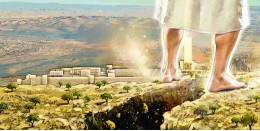
A brother in the Lord asked if I would discuss dispensationalism and Zechariah 14 with a blogger who owns a bible prophecy website. I gladly acceptedx.,, cvnX n the inviation and will provide to the reader the discussion as it occurred.. I have changed the web site owners name to “Brother” for the sake of his privacy, and each of my responses are italicized and indented for clarity sake.
Genesis 10:25
And unto Eber were born two sons: the name of one was Peleg; for in his days was the earth divided; and his brother’s name was Joktan.next subject.
Does God walk literally upon the mountains? I know not, nor do you. I live near a mountain. I know that nobody lives on top of the mountain, and the vast majority of the time, nobody is on top of the mountain. I know that Mt. Everest is desolate, and thus, there is nobody who lives near who could confirm or deny such a thing, therefore, the question is impossible to confirm or deny.
But even more, it is IMPOSSIBLE to deny!
As we know from scripture, Jesus, in resurrected form, appears to his disciples in ways that they cannot discern that it is even Jesus. The Bible also says that God is invisible.
Colossians 1:15
Who is the image of the invisible God, the firstborn of every creature:
If an invisible God walks literally upon the mountains where there is nobody around, how in the world are you able to deny such a thing? You are completely incapable to say that God does not literally walk upon the mountains, and you are completely incapable of making a doctrine, or teaching, that God does not do such things, when the Bible clearly says that he does.
Be careful. It’s best to just believe scripture, rather than try to deny it. And if it requires the denial of scripture, then you are on very bad ground.
Sincerely,
Brother
Brother
In your last response you said – “Does God walk literally upon the mountains? I know not, nor do you. “Why does Amos say He does? Is it not to inform us of something?
In the original post, I believe you said that you expect Jesus to touch down on the Mt of Olives and because of this, that the mount would split (or something to that effect). This is the context of my discussion. Is the prophet Zechariah describing a literal touching of the mount with God’s literal feet? Correct me if I have read you wrong, but I think you would interpret Zechariah that Jesus would land/touch/set/stand/ etc on Mt of Olives in fulfillment of Zech 14. I merely brought Amos and Micah into the discussion to ask if these incidents are of the same literalness.
No one wants to deny the Word. I surely do not, and I am convinced you are striving to be faithful. Finding the intent of a scripture should not be construed as a denial of scripture if it rubs you or I the wrong way. Remember that the Word is to transform us, not us try to conform the Word (to our liking!)
I would agree the Bible clearly teaches that God “treads on the high places of the earth” and “the LORD cometh forth out of his place” and that He will “tread upon the high places of the earth” causing the mountains to be “molten under him” and the valleys “shall be cleft, as wax before the fire…”.(v4). My concern is to try to understand what the prophet was trying to communicate.
If, as you say, no one can deny or prove whether an invisible God walks on the mountains, to what point did the prophet tell us these things?
Next question
If we take Zechariah in a literal manner
Verse 8 – the “fountain of living waters,” Could this phrase represent a spiritual truth? Zech 13:1 states “a fountain will be opened for the house of David and the inhabitants of Jerusalem, for sin and for impurity”
If we understand the fountain literally, the natural conclusion would be that the waters cleanse from sin. Would this be acceptable to you, and if not, on what basis do you reject the fountain as being literally able to cleanse from sin, but accept “And his feet shall stand in that day upon the mount of Olives”, as the physical return of Christ (Notice that it does not say that He lands on the mount, or descends on the mount, or even that he climbs the mount to get to the top.)
Please do not respond asking me if I believe in the physical return of Christ – I surely do and with every day expect it sooner and sooner!
Looking forward to your response
Be blessed
Please visit next time as we continue to discuss issues that arise between my dispensational friend and myself.
Thanks for visiting and as always, I love getting comments from those who read this blog.
Follow Considering the Bible on WordPress.com
Thanks again for coming to visit. I hope you found something of interest in this post and would appreciate a comment, to begin a discussion.